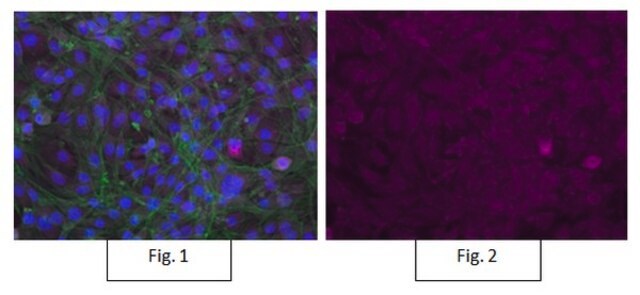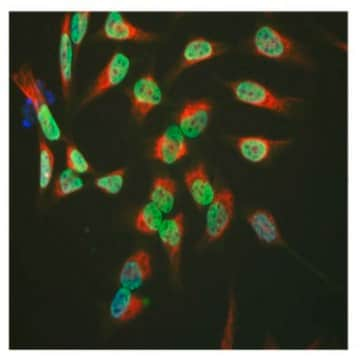MABN1834
Anti-phospho-Filamin-A (Ser2152) Antibody, clone PS2
clone PS2, from mouse
Synonym(s):
Filamin-A, FLN-A, Actin-binding protein 280, ABP-280, Alpha-filamin, Endothelial actin-binding protein, Filamin-1, Non-muscle filamin, phospho-Filamin-A (Ser2152)
About This Item
Recommended Products
biological source
mouse
Quality Level
antibody form
purified immunoglobulin
antibody product type
primary antibodies
clone
PS2, monoclonal
species reactivity
mouse, human
technique(s)
immunocytochemistry: suitable
immunofluorescence: suitable
western blot: suitable
isotype
IgG2bκ
NCBI accession no.
UniProt accession no.
shipped in
wet ice
target post-translational modification
phosphorylation (pSer2152)
Gene Information
human ... FLNA (2316)
General description
Specificity
Immunogen
Application
Neuroscience
Developmental Neuroscience
Western Blotting Analysis: A representative lot detected cellular FLN-A pSer2152 phosphorylation induction upon serum, forskolin, or EphB2-Fc addition to serum-starved CHP100 human neuroblastoma cells (Zhang, J. et al. (2013). J. Neurosci. 33(40):15735-15746).
Immunocytochemistry Analysis: A representative lot detected cellular FLN-A pSer2152 phosphorylation induction in neuronal progenitors from frontal cortex of E13.5–E14.5 mouse embryos, CHP100 human neuroblastoma cells, and A7, but not FLN-A-deficient M2, human melanoma cells upon forskolin addition (Zhang, J. et al. (2013). J. Neurosci. 33(40):15735-15746).
Immunofluorescence Analysis: A representative lot detected FLN-A pSer2152 immunoreactivity extended to the proliferative zone (PZ) surface at the periventricular heterotopia (PVH) congenital malformation site in the forebrain (FB) of E17.5 MEKK-/- mouse embryos in addition to the FLN-A pSer2152 immunoreactivity in the intermediate zone (IZ) and cortical plate (CP) seen in both wild-type and MEKK-knockout embryos by fluorescent immunohistochemistry (Sarkisian, M.R., et al. (2006). Neuron. 52(5):789-801).
Quality
Western Blotting Analysis: A 1:125 dilution of this antibody detected Calyculin A-stimulated Filamin-A Ser2152 phosphorylation in mouse embryonic fibroblasts (MEFs).
Target description
Physical form
Storage and Stability
Other Notes
Disclaimer
Not finding the right product?
Try our Product Selector Tool.
Storage Class Code
12 - Non Combustible Liquids
WGK
WGK 1
Flash Point(F)
Not applicable
Flash Point(C)
Not applicable
Regulatory Listings
Regulatory Listings are mainly provided for chemical products. Only limited information can be provided here for non-chemical products. No entry means none of the components are listed. It is the user’s obligation to ensure the safe and legal use of the product.
JAN Code
MABN1834:
Certificates of Analysis (COA)
Search for Certificates of Analysis (COA) by entering the products Lot/Batch Number. Lot and Batch Numbers can be found on a product’s label following the words ‘Lot’ or ‘Batch’.
Already Own This Product?
Find documentation for the products that you have recently purchased in the Document Library.
Our team of scientists has experience in all areas of research including Life Science, Material Science, Chemical Synthesis, Chromatography, Analytical and many others.
Contact Technical Service







